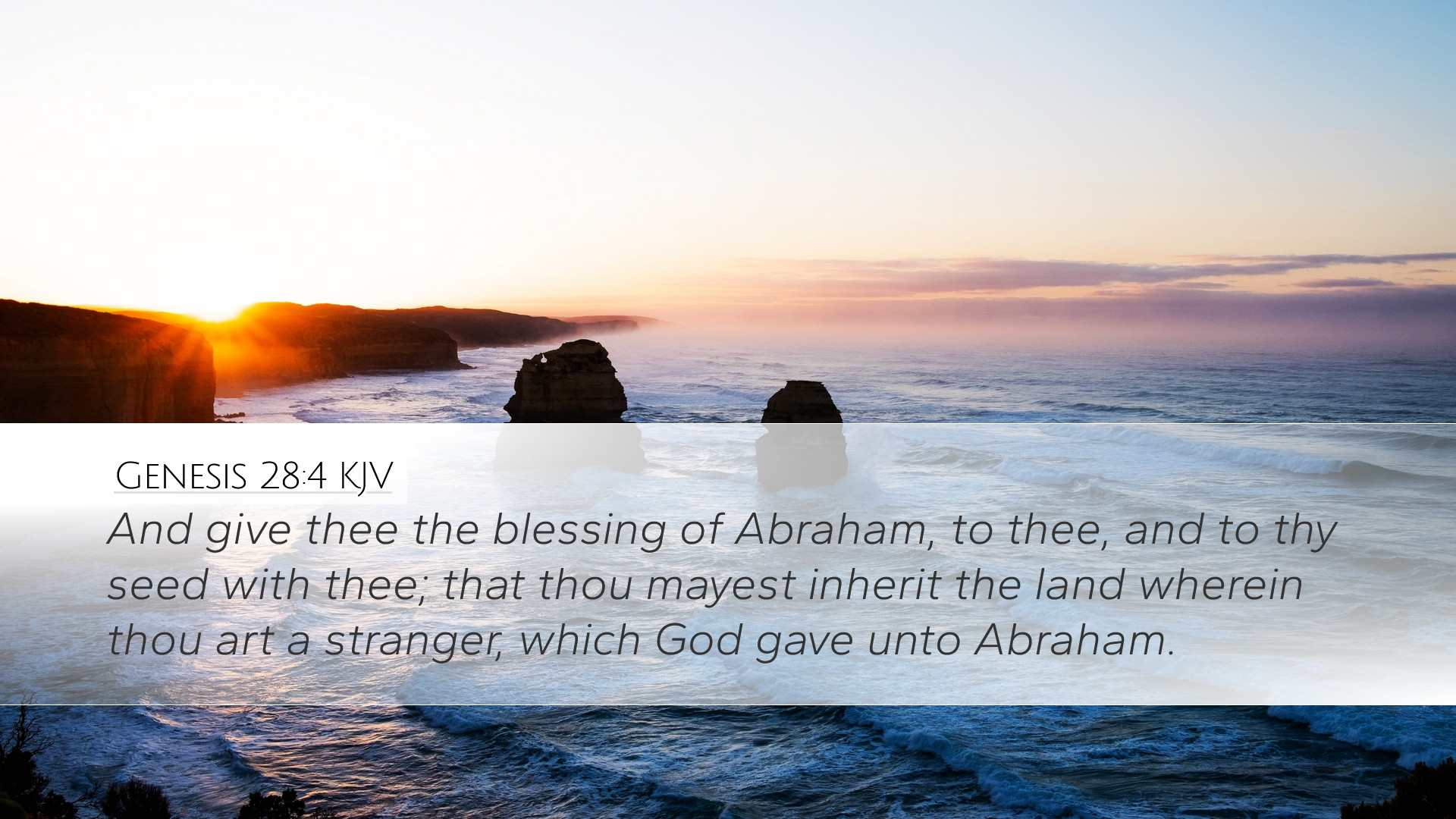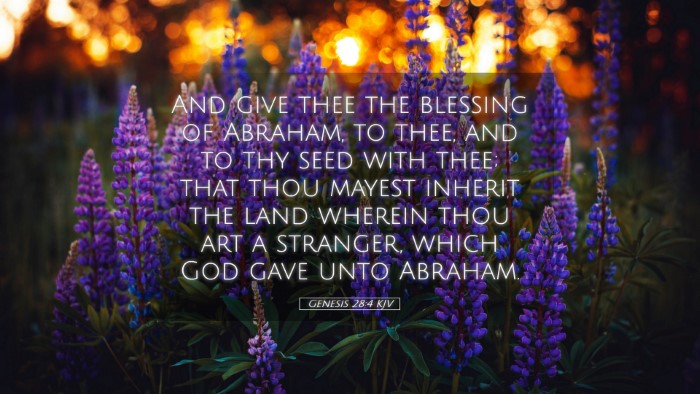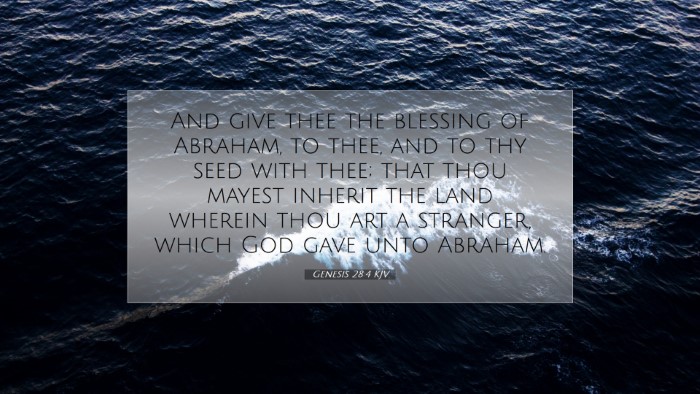Commentary on Genesis 28:4
Bible Verse: "And give thee the blessing of Abraham, to thee, and to thy seed with thee; that thou mayest inherit the land wherein thou art a stranger, which God gave unto Abraham." (Genesis 28:4)
Introduction
Genesis 28:4 is a pivotal moment in the narrative of Jacob, the son of Isaac and grandson of Abraham. It encapsulates the divine promises that have been passed down through generations. In this verse, Jacob is reminded of the covenant made with his grandfather Abraham, a theme of great significance throughout the Scriptures. We will explore the insights from various public domain commentaries, dissecting the implications of this blessing for Jacob, his descendants, and the unfolding biblical story.
Theological Significance
The promise made in Genesis 28:4 serves as a theological anchor in the Genesis narrative. Different commentators emphasize the multifaceted dimensions of this blessing and its implications:
- Matthew Henry: Henry reflects upon the nature of the blessing bestowed upon Jacob, underlining it as a divine favor that carries immense weight. He notes that this blessing not only encompasses material prosperity but also spiritual vitality. For Henry, the blessing signifies God's active involvement in Jacob's life and future.
- Albert Barnes: Barnes highlights the passing of the covenantal blessing from Abraham to Isaac and now to Jacob. He delineates how this moment signifies the continuity of God's promises through the generations. The blessing is not merely a family inheritance but a divine sanction over the lineage that will be crucial in the unfolding of redemptive history.
- Adam Clarke: Clarke elaborates on the geographic and spiritual implications of the land promise. He emphasizes that the land symbolizes a resting place for the people of God, establishing a connection between physical space and spiritual identity. Clarke stresses the importance of Jacob's role in this lineage as pivotal to the Abrahamic covenant.
Contextual Analysis
Understanding Genesis 28:4 requires careful attention to its immediate and broader context within Scripture:
- Immediate Context:
In the previous chapter (Genesis 27), Jacob deceives his father Isaac to receive the blessing that was meant for his brother Esau. Genesis 28:4 serves as a divine affirmation and redirection of Jacob's path, indicating that, despite his failings, God's purposes will prevail.
- Broader Context:
This blessing is critically linked to God's covenant with Abraham (Genesis 12:1-3; 15:18-21), which establishes the foundation for the entire narrative of Israel. This underscores the enduring faithfulness of God who honors His promises through flawed individuals.
Implications for Jacob's Journey
Jacob, embarking on his journey to Haran, is filled with uncertainty. The blessing in Genesis 28:4 shapes his identity and purpose:
- Identity:
The blessing serves as an identity marker for Jacob, affirming that he is part of God's elect people. This identity is further solidified in the subsequent dream vision (Genesis 28:10-22), where God reiterates this commitment to Jacob.
- Mission:
Jacob’s journey is not just about personal fulfillment; it is interwoven with the mission of God. The blessing indicates that Jacob will play a crucial role in the unfolding of God's redemptive plan for humanity.
- Legacy:
Jacob’s descendants, the tribes of Israel, will continue the work initiated through this blessing. The promise of land and descendants signifies a divine foundation for the people of Israel and, by extension, the larger narrative of salvation.
Theological Reflections and Applications
The implications of Genesis 28:4 are rich for theological reflection and practical application:
- Grace in Imperfection:
Jacob’s deception serves as a reminder that God can and does work through imperfect individuals. The blessing reveals that God’s grace overshadows human failing, a theme echoed throughout Scripture.
- The Importance of Family Blessings:
The transference of blessings from Abraham to Isaac to Jacob showcases the importance of generational blessings. This can encourage pastors and leaders to consider the impact of their spiritual legacy on future generations.
- The Assurance of God’s Promises:
For theologians and students, this verse serves as a profound assurance that God's promises remain steadfast. The continuity of the covenantal blessings offers hope and encouragement in the face of life's uncertainties.
Conclusion
Genesis 28:4 is a powerful verse that encapsulates key themes of identity, mission, and divine promise within the biblical narrative. Through careful study of public domain commentaries by Matthew Henry, Albert Barnes, and Adam Clarke, we gain deeper insights into the weight of this blessing upon Jacob and its implications for Israel’s future. For pastors, students, theologians, and Bible scholars, this passage serves as a reminder of God's unyielding faithfulness and the transformative power of His promises.


